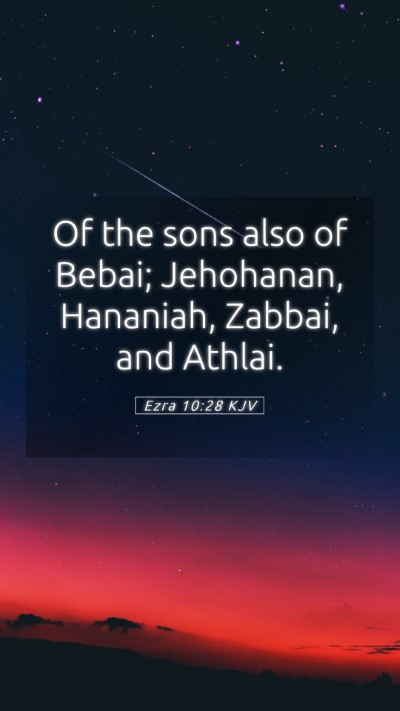Understanding Ezra 10:28
Ezra 10:28 states: "And of the sons of Bebai; Jehoahaz, and Elihu, and Shelemiah, and the rest of their brethren." This verse is part of a larger narrative concerning the return of the Jewish exiles from Babylon and their reinstitution of the covenant with God. It captures a moment where certain families are identified, emphasizing the organizational and communal aspects of the Jewish people as they sought to restore themselves in accordance with the Law.
Bible Verse Meanings
This verse serves as a reminder of the importance of lineage and community in the biblical narrative. Matthew Henry notes that during this time of reformation, the identification of these families illustrates the restoration of proper worship and societal structure among the Israelites. The specific mention of families highlights their restoration to not only community life but to their role in fulfilling God's covenant.
Bible Verse Interpretations
Albert Barnes emphasizes that the genealogy established here is crucial for understanding the continuity of God's people and the fulfillment of His promises. Each name represents a family's commitment to returning to a covenant relationship with God, which is a central theme in Ezra's narrative.
Bible Verse Understanding
Adam Clarke points out that the mention of the sons of Bebai underscores the individual responsibilities and the relational fidelity each family had towards God and their community. In the context of the narrative, it reflects their willingness to be reunited in worship and obedience, which is critical for a nation redefined after exile.
Scripture Analysis of Ezra 10:28
When analyzing this verse, we observe a pattern that characterizes the post-exilic community's efforts to restore their identity. The names listed may seem insignificant, yet they represent the restoration of community ties – a fundamental aspect of biblical teachings. As such, understanding these names and their meanings is integral to grasping the depth of the community's restoration journey.
Biblical Exegesis
Ezra's record serves multiple purposes: it affirms God's faithfulness, demonstrates the importance of remembering one's heritage, and emphasizes the communal aspect of worship and obedience. The names and familial affiliations outlined signify the deeper theological meaning of belonging and identity.
Bible Study Insights
In engaging with Ezra 10:28, one can reflect on the broader implications of restoration in life. The identification of families not only reinstates their historical function but also calls contemporary believers to appreciate the significance of their church communities and familial ties in fostering faithfulness to God's covenant.
Meaning of Bible Verses
Understanding this verse requires us to consider various aspects: the importance of family in faith contexts, the commitment to community under God’s law, and the responsibility we share in carrying the legacy of faith to future generations.
Understanding Scripture
When delving into this scripture, it's essential to view it as part of a larger narrative of redemption and covenantal restoration. Each name, while appearing as a mundane detail, serves to highlight God’s continued faithfulness to His people amid their challenges.
Related Cross References
- 1 Chronicles 9:14 - Details about the families that returned from exile.
- Nehemiah 10:28-29 - Illustrates covenant renewal, emphasizing communal responsibilities.
- Ezra 2:1-2 - The list of returning exiles and their family leaders.
- Malachi 2:10-12 - Discusses the importance of familial faithfulness.
Applying Ezra 10:28 to Daily Life
The application of this verse can lead to a deeper understanding of the role of community and the importance of faithfulness in one's familial lines. It prompts reflection on how individuals contribute to the larger body of faith and the historical identities carried forward through generations.
Conclusion
In summary, Ezra 10:28 offers rich insights into the significance of community and familial identity in the biblical narrative. Through the lens of commentary from revered scholars like Matthew Henry, Albert Barnes, and Adam Clarke, we observe the intricate ties between genealogy, community restoration, and God's faithfulness. The verse invites us to explore not just historical lineage but our spiritual commitments within our communities today.


